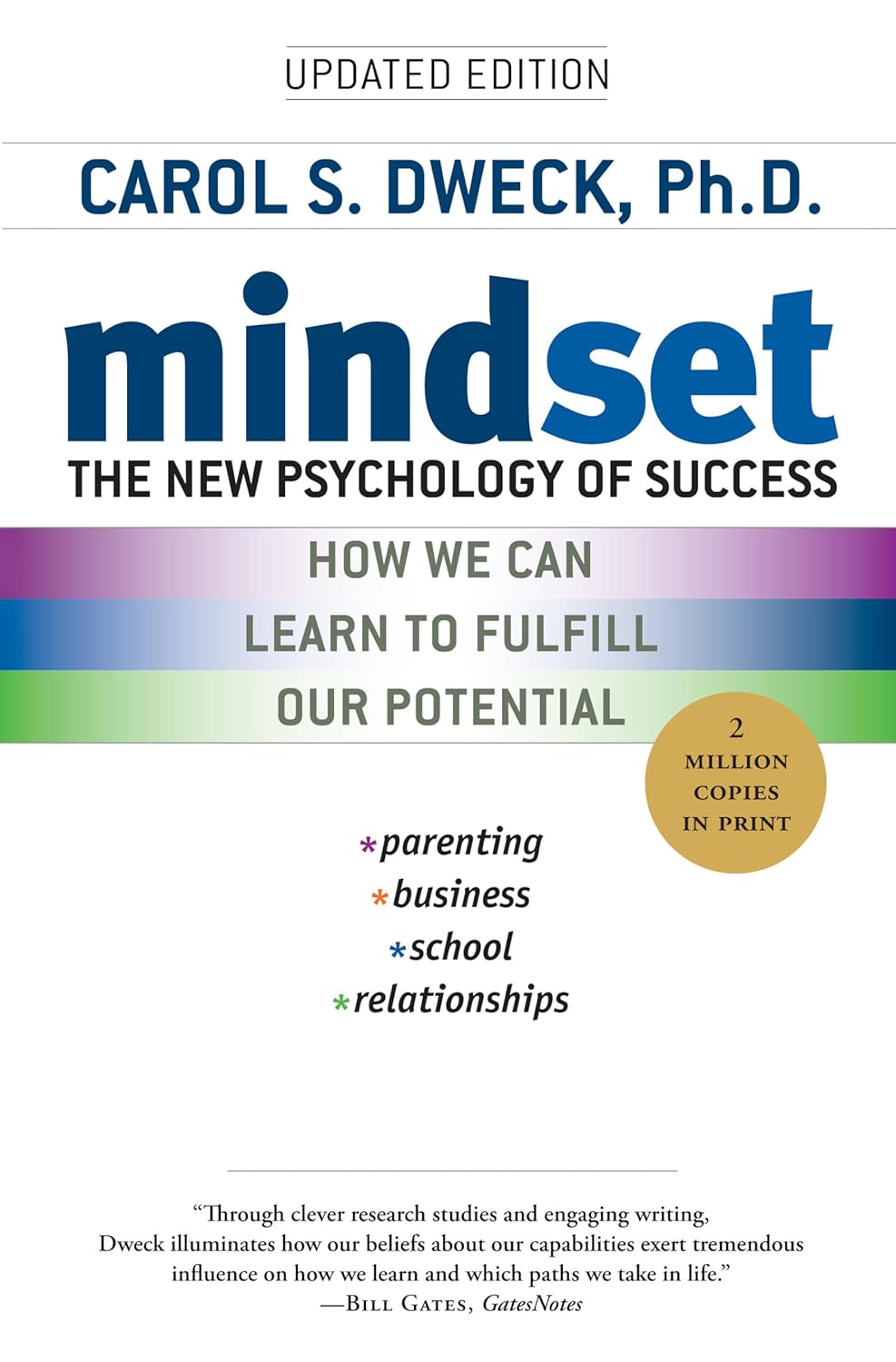
Supercharge Your Success with These Growth Mindset Strategies
The Power of Positivity: Growth Mindset Strategies for Personal Growth
published: Friday, March 29, 2024
In today's competitive landscape, achieving success is often equated with possessing the right soft skills and knowledge. However, a crucial component is sometimes overlooked: a growth mindset. A growth mindset is a psychology of success emphasizing the belief that abilities and intelligence can be developed through dedication and effort. In this article, we'll explore how cultivating a growth mindset can unlock your full potential and propel you toward success. We'll delve into the origins of growth mindset psychology, examine effective strategies for fostering this mindset, and provide practical activities, statements, and behaviors to help you integrate it into your daily life. By understanding the power of a growth mindset and implementing these strategies, you'll be better equipped to navigate challenges, overcome obstacles, and ultimately achieve your goals.
Understanding the Growth Mindset
The term "growth mindset" refers to the belief that intelligence, abilities, and talents are not fixed traits but can be developed through dedication, effort, and perseverance. Individuals with a growth mindset embrace challenges, view failures as opportunities for growth, and are resilient in the face of setbacks. Unlike a fixed mindset, which assumes that intelligence and abilities are static and predetermined, a growth mindset thrives on continuous learning and improvement. This mindset fosters a belief in one's capacity to learn and develop new skills, leading to a more positive and proactive approach to personal and professional development.
In contrast to a growth mindset, a fixed mindset is characterized by the belief that intelligence and abilities are innate and unchangeable. Those with a fixed mindset tend to avoid challenges, fear failure, and perceive effort as fruitless. Instead of seeing setbacks as opportunities for learning and growth, individuals with a fixed mindset may interpret them as evidence of their inherent limitations. The concept of growth mindset gained prominence through the pioneering research of psychologist Carol Dweck. Dweck's groundbreaking work on mindset theory, spanning several decades, has shed light on the impact of beliefs about intelligence on motivation, resilience, and achievement. Through empirical studies and real-world applications, Dweck and her colleagues have demonstrated the transformative power of adopting a growth mindset, inspiring individuals and organizations to embrace the philosophy of continuous improvement and resilience.
Our Favorite
"Mindset: The New Psychology of Success" by Carol S. Dweck
Renowned psychologist Carol S. Dweck unveils the power of mindset in this updated edition of a bestselling classic. With transformative insights, Dweck redefines success, emphasizing lifelong resilience and self-improvement. Through engaging writing and research studies, she demonstrates how our beliefs about capabilities shape our learning and life paths. Praise from luminaries like Bill Gates underscores the book's impact. Dweck introduces the notion of false growth mindset and explores its ramifications, guiding readers toward a deeper understanding. Expanded to encompass group dynamics, the book offers practical strategies for parents, educators, and leaders to cultivate growth mindsets in others. Discover how adopting the right mindset can propel personal and collective achievement.

The Power of a Growth Mindset
A growth mindset catalyzes personal and professional development, fundamentally altering how individuals approach challenges and setbacks. By embracing the belief that abilities can be developed through dedication and effort, individuals with a growth mindset are more inclined to seek opportunities for learning and growth. In personal development, this mindset fosters a sense of curiosity and resilience, encouraging individuals to step out of their comfort zones and take on new challenges. In the professional sphere, a growth mindset fuels innovation and creativity, as individuals are more willing to experiment, iterate, and adapt to pursue excellence.
The benefits of adopting a growth mindset extend far beyond mere skill acquisition, encompassing essential qualities such as resilience, adaptability, and motivation. In the face of adversity, individuals with a growth mindset are more likely to persevere, viewing setbacks as temporary obstacles rather than insurmountable barriers. This resilience enables them to bounce back from failure stronger and more determined, ultimately propelling them towards success. A growth mindset cultivates adaptability, empowering individuals to embrace change and navigate uncertainty with confidence and agility. By reframing challenges as opportunities for growth, individuals with a growth mindset remain motivated and engaged, fueling a continuous cycle of improvement and achievement.
Strategies for Cultivating a Growth Mindset
Embracing challenges and viewing failures as opportunities for growth is a cornerstone of cultivating a growth mindset. Rather than shying away from difficulties, individuals with a growth mindset welcome them as chances to stretch their abilities and expand their horizons. For example, consider the story of Thomas Edison, who failed at numerous attempts to invent the light bulb. Instead of becoming discouraged, Edison famously remarked, "I have not failed. I've just found 10,000 ways that won't work." His perseverance and willingness to learn from each setback ultimately led to his triumphant invention of the light bulb, demonstrating the transformative power of viewing failures as stepping stones to success.
Cultivating a love for learning and continuous improvement is another fundamental strategy for fostering a growth mindset. This involves embracing curiosity and exploration and seeking opportunities to expand knowledge and skills. For instance, imagine an individual who sets aside time each day to read books, attend workshops, and engage in online courses related to their interests and goals. By prioritizing learning and personal development, they acquire new insights and perspectives and cultivate a mindset that thrives on continuous growth and evolution.
Adopting a positive attitude and reframing setbacks as temporary setbacks is essential for maintaining a growth mindset in adversity. Rather than dwelling on past failures or setbacks, individuals with a growth mindset focus on the lessons learned and the potential for future success. Take, for example, the athlete who experiences a defeat in a competition. Instead of succumbing to defeatism, they view the setback as an opportunity to identify areas for improvement and redouble their training efforts. By maintaining a positive outlook and reframing setbacks as temporary challenges, they remain resilient and motivated in achieving their goals.
Our Favorite
"The Growth Mindset Workbook: CBT Skills to Help You Build Resilience, Increase Confidence, and Thrive through Life's Challenges" by Elaine Elliott-Moskwa PhD
Discover how to break free from self-limiting beliefs and embrace a growth mindset with The Growth Mindset Workbook. Grounded in cognitive behavioral therapy (CBT) principles, this workbook offers essential skills to transform the way you think about your abilities. Based on Carol Dweck's renowned research, it provides practical exercises to cultivate resilience, increase confidence, and thrive through life's challenges. By shedding fixed mindset attitudes and adopting a growth mindset, you'll unlock your full potential and build a more meaningful, values-driven life. Whether you're seeking personal growth or professional development, this step-by-step guide empowers you to overcome obstacles and maximize your capabilities. Take control of your mindset and say yes to a life of growth and possibility.

Activities to Foster a Growth Mindset
Setting SMART (Specific, Measurable, Achievable, Relevant, Time-bound) goals is fundamental for cultivating a growth mindset. By establishing clear and attainable objectives, individuals can maintain focus and direction in their personal and professional endeavors. For example, envision a student who sets a SMART goal of improving their grade in a challenging subject by the end of the semester. With a specific target in mind and a plan of action, they are better equipped to track their progress, stay motivated, and ultimately achieve their desired outcome.
Practicing mindfulness and self-reflection is another valuable activity for enhancing self-awareness and nurturing a growth mindset. Individuals can cultivate a greater sense of present-moment awareness and emotional resilience through mindfulness techniques such as meditation and deep breathing exercises. By regularly reflecting on their thoughts, feelings, and experiences, individuals can gain valuable insights into their strengths, weaknesses, and areas for growth. For instance, imagine a professional who sets aside time each day to journal about their successes, challenges, and lessons learned. This practice of self-reflection promotes self-awareness and facilitates personal growth and development.
Seeking feedback and using it constructively to improve is a proactive activity that fosters a growth mindset. Rather than viewing feedback as criticism or judgment, individuals with a growth mindset see it as valuable input for learning and growth. By actively soliciting feedback from peers, mentors, and supervisors, individuals can gain fresh perspectives and identify blind spots in their performance. For example, consider an entrepreneur who regularly seeks customer feedback on their products and services. By incorporating customer insights and suggestions into their business strategy, they can adapt and innovate more effectively, driving continuous improvement and success.
Key Statements and Behaviors of a Growth Mindset
"I can learn from this." This simple yet powerful statement encapsulates the essence of a growth mindset. Instead of viewing challenges or failures as insurmountable obstacles, individuals with a growth mindset approach them with curiosity and optimism. By adopting a mindset focused on learning and growth, they recognize that every experience—whether positive or negative—offers valuable lessons and opportunities for improvement. For example, when faced with a setback or mistake, someone with a growth mindset might reflect on what went wrong and how they can do better next time rather than dwelling on feelings of frustration or defeat.
"Effort is the path to mastery." This statement highlights the importance of hard work, perseverance, and dedication in achieving success. Individuals with a growth mindset understand that mastery is not achieved overnight but through sustained effort and practice over time. Rather than relying solely on innate talent or ability, they prioritize consistent effort and incremental progress. For instance, a musician striving to master a new instrument recognizes that it will require hours of practice and dedication to achieve proficiency. By embracing the journey of growth and development, they remain committed to putting in the necessary effort to reach their goals, regardless of any initial setbacks or challenges they may encounter.
Conclusion
Developing a growth mindset is not just about achieving success; it's about embracing a lifelong journey of learning and growth. By adopting the strategies outlined in this article and incorporating growth mindset statements and behaviors into your daily life, you can harness the power of positivity and unlock your full potential. Remember, success is not determined by innate talent alone but by the mindset and actions you cultivate. So, dare to challenge yourself, embrace the journey, and watch as your success story unfolds.